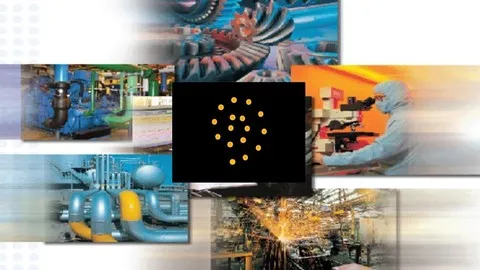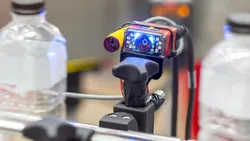
Free PLC Tutorial - PLC Programming 100 
This free course provides an introduction to PLC programming and control systems, giving learners the opportunity to gain a comprehensive understanding of the subject. ▼
ADVERTISEMENT
Course Feature
![]() Cost:
Cost:
Free
![]() Provider:
Provider:
Udemy
![]() Certificate:
Certificate:
No Information
![]() Language:
Language:
English
![]() Start Date:
Start Date:
Self Paced
Course Overview
❗The content presented here is sourced directly from Udemy platform. For comprehensive course details, including enrollment information, simply click on the 'Go to class' link on our website.
Updated in [April 29th, 2023]
This course, Free PLC Tutorial - PLC Programming 100, provides an introduction to the programming of Programmable Logic Controllers (PLCs) for industrial use. It is designed for those who are new to PLCs and covers the basics of PLC programming. The course covers topics such as instrumentation, process controls, SCADA, ICSS, DCS, ESD, PSD, and F&G. It is suitable for those working in the oil and gas, water treatment, power generation, and petrochemical industries. Upon completion of the course, participants will have a basic understanding of PLC programming and be able to apply it to their own projects.
[Applications]
This course provides a comprehensive introduction to PLC programming for industrial use. After completing this course, students should be able to apply their knowledge to programming PLCs for oil and gas, water treatment, power generation, and petrochemical industries. They should also be able to apply their knowledge to instrumentation, process controls, SCADA, ICSS, DCS, ESD, PSD, and F&G. Additionally, students should be able to troubleshoot and debug PLC programs.
[Career Paths]
1. Automation Engineer: Automation Engineers are responsible for designing, developing, and maintaining automated systems and processes. They use a variety of technologies, such as PLCs, SCADA, and DCS, to create efficient and cost-effective solutions. Automation Engineers are in high demand as the need for automation increases in the industrial sector.
2. Process Control Engineer: Process Control Engineers are responsible for designing, developing, and maintaining process control systems. They use a variety of technologies, such as PLCs, SCADA, and DCS, to create efficient and cost-effective solutions. Process Control Engineers are in high demand as the need for automation increases in the industrial sector.
3. Instrumentation Engineer: Instrumentation Engineers are responsible for designing, developing, and maintaining instrumentation systems. They use a variety of technologies, such as PLCs, SCADA, and DCS, to create efficient and cost-effective solutions. Instrumentation Engineers are in high demand as the need for automation increases in the industrial sector.
4. Electrical Engineer: Electrical Engineers are responsible for designing, developing, and maintaining electrical systems. They use a variety of technologies, such as PLCs, SCADA, and DCS, to create efficient and cost-effective solutions. Electrical Engineers are in high demand as the need for automation increases in the industrial sector.
[Education Paths]
1. Bachelor of Science in Electrical Engineering: This degree program focuses on the design, development, and implementation of electrical systems and components. It covers topics such as circuit analysis, digital systems, power systems, and control systems. Students will also learn about the latest technologies and trends in the industry, such as automation, robotics, and artificial intelligence. This degree is ideal for those looking to pursue a career in the industrial automation sector.
2. Bachelor of Science in Computer Engineering: This degree program focuses on the design, development, and implementation of computer systems and components. It covers topics such as computer architecture, operating systems, software engineering, and computer networks. Students will also learn about the latest technologies and trends in the industry, such as cloud computing, big data, and machine learning. This degree is ideal for those looking to pursue a career in the industrial automation sector.
3. Master of Science in Automation and Control: This degree program focuses on the design, development, and implementation of automated systems and components. It covers topics such as control systems, robotics, and artificial intelligence. Students will also learn about the latest technologies and trends in the industry, such as the Internet of Things, industrial Internet of Things, and Industry 4.0. This degree is ideal for those looking to pursue a career in the industrial automation sector.
4. Master of Science in Industrial Engineering: This degree program focuses on the design, development, and implementation of industrial systems and components. It covers topics such as operations research, production systems, and quality control. Students will also learn about the latest technologies and trends in the industry, such as lean manufacturing, Six Sigma, and predictive analytics. This degree is ideal for those looking to pursue a career in the industrial automation sector.
Pros & Cons

Interesting content

Free Udemy learning

Good for new programming learning

Basics of PLC covered

Short videos

Lack of reallife examples

Only basics covered
Course Provider

Provider Udemy's Stats at AZClass
Discussion and Reviews
0.0 (Based on 0 reviews)
Explore Similar Online Courses

Healthy and safe telework

Understanding the Java Virtual Machine: Class Loading and Reflection

Python for Informatics: Exploring Information

Social Network Analysis

Introduction to Systematic Review and Meta-Analysis

The Analytics Edge

DCO042 - Python For Informatics

Causal Diagrams: Draw Your Assumptions Before Your Conclusions

Whole genome sequencing of bacterial genomes - tools and applications

PLC Memory Organization

PLC: Industrial Sensors


Start your review of Free PLC Tutorial - PLC Programming 100